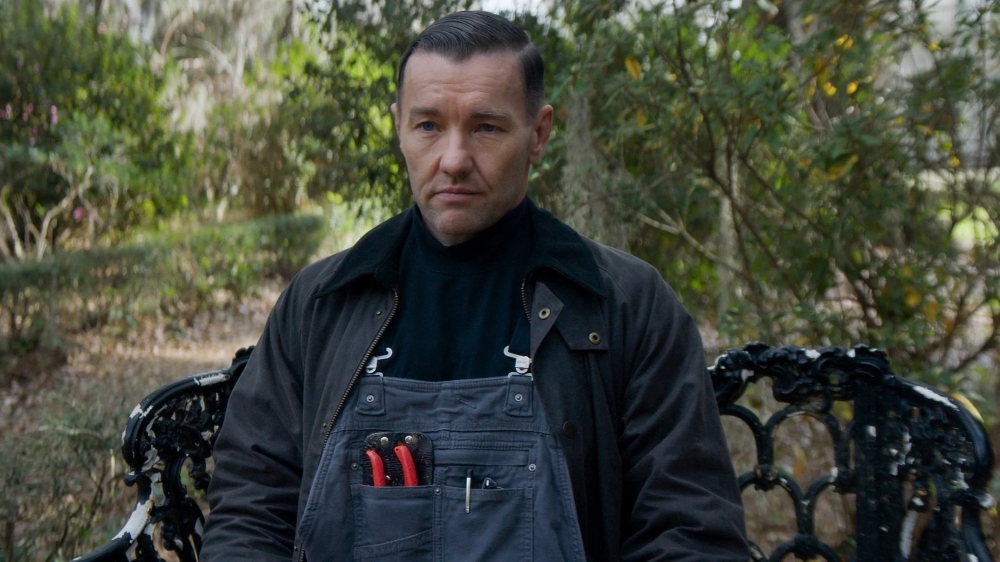
First Reformed, The Card Counter, and Master Gardener have become known as Paul Schrader‘s “Man in a Room” trilogy featuring Ethan Hawke, Oscar Isaac, and Joel Edgerton as men who are ultimately unable to escape violence.
The industry icon’s latest film, Master Gardener, finds Edgerton playing Narvel Roth, a highly disciplined horticulturalist who tends to a large garden owned by wealthy dowager Norma Haverhill (Sigourney Weaver). When Norma’s grandniece Maya (Quintessa Swindell) shows up looking for a job as Narvel’s apprentice, his violent past fuels a twisted journey toward redemption.
After working together on Dog Eat Dog (2016), First Reformed (2017), and The Card Counter (2021), Schrader turned to Editor Benjamin Rodriguez Jr. once again for Master Gardener, and Rodriguez had his work cut out for him, as he said it was the most challenging entry in Schrader’s thematic trilogy given the director’s fluid vision for the film. Rodriguez also worked with the master filmmaker on Dark (2017), which was Schrader’s unsanctioned director’s cut of his 2014 film Dying of the Light starring Nicolas Cage.
Below the Line recently spoke with Benjamin Rodriguez Jr. about crafting Master Gardener with Schrader, the tools he used to edit the film remotely while keeping a healthy distance from the 76-year-old Schrader during the age of Covid, and re-editing Dying of the Light.
[Note: This interview has been edited for clarity.]
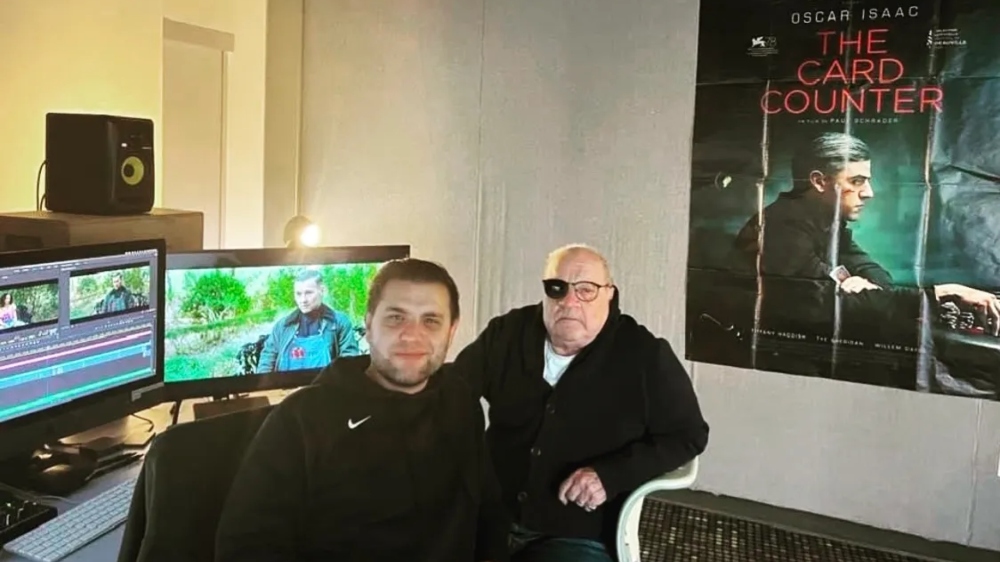
Below the Line: I believe this is the fifth feature you’ve edited for director Paul Schrader.
Benjamin Rodriguez Jr.: Fourth. Fourth one.
BTL: We have Dog Eat Dog, First Reformed, and The Card Counter, so does Dark not count?
Rodriguez Jr.: So Dark was something. There’s a film, Dying of the Light, that he made years ago, before I even met him, and that was a very difficult process for him. He wrote and directed the movie. Nicolas Cage is in it. I think he realized after, when he was starting to edit, that he didn’t direct the movie the right way. Nicolas Cage’s character, his brain, is deteriorating. He needed the directing to kind of feel that way. He tried to fix things in the edit and it wasn’t coming out. And then the financiers just took the movie away from him and they recut it. They kicked him out of the whole process. He got very vocal about it on social media and everything. It was this kind of stain that he wanted to help fix.
When we were doing First Reformed, he asked me to recut Dying of the Light, which was insane, for various [reasons]. The producers didn’t give us access to all the footage that they shot. Paul had, like, a DVD [or] a Blu-ray of the film, and then some DVDs of his rough cuts. So Dark is essentially his director’s cut, the re-edit. I don’t count that as a whole feature because I wasn’t on it from the get-go, from the beginning, you know? It was a fun process. The movie still doesn’t work, cause it’s flawed, and he admits that. What we did, at least, brought some kind of closure to the whole debacle of what that was.
BTL: We’ll call it four-plus. Does that sound better?
Rodriguez Jr.: There ya go. That sounds good.
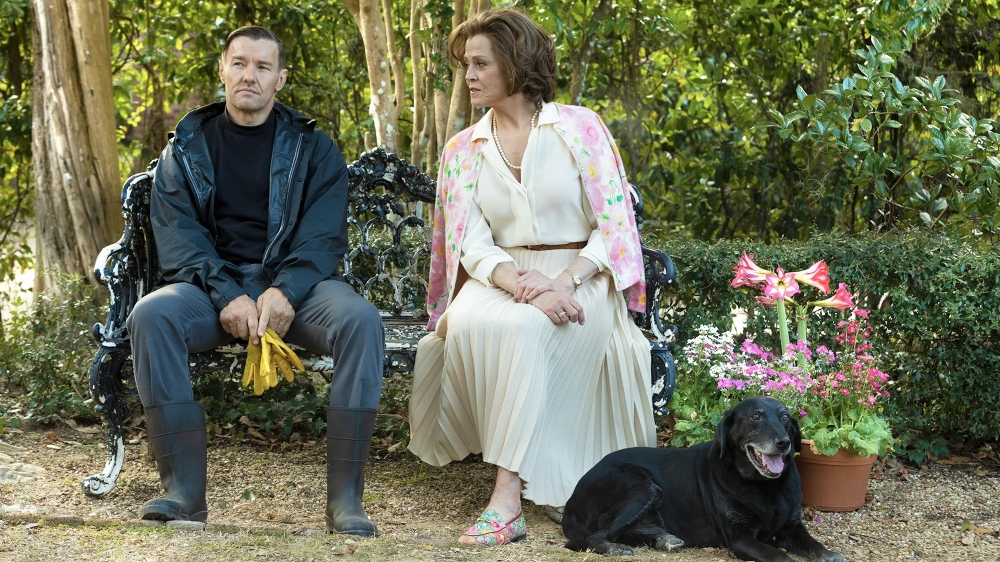
BTL: How did you originally meet Schrader, and what attracts you to his projects?
Rodriguez Jr.: We originally met, I think, in 2015. I was an Assistant Editor at a commercial house here in New York, in SoHo, called Lost Planet, which is owned by Hank Corwin, who is a legendary editor and [an] Academy Award nominee for various movies. The latest being, like, the three Adam McKay movies (The Big Short, Vice, Don’t Look Up). He had an earlier career with Oliver Stone, but he started off with commercials and he became a legend with his commercial-style editing. The editing of JFK and Natural Born Killers, that’s pretty much Hank Corwin. And then the latest McKay movies, particularly The Big Short, and the editing style of those movies.
I was just an assistant editor, kind of junior commercial editor there. There was an editor that came in to work and do commercials. His name’s Jay Rabinowitz. Jay is kind of like a staple — a legendary New York City editor who started off working with Jim Jarmusch, then did Requiem for a Dream with Darren [Aronofsky] and The Fountain, and then 8 Mile. Jay is a legend in the business, and particularly in New York City. He wanted to take a break from features, and he met Hank when they were doing The Tree of Life, and Hank was like, ‘Well, come do some commercials.’ So he came and started doing commercials and I was his assistant. We hit it off really [well]. And Jay had cut Paul Schrader’s movie Affliction back in the ’90s. And just out of the blue, Paul sends Jay an email asking if he knows any young editors for his next movie.
Paul was set on finding key crew members like the DP, costume [designer, and] editor, [who] were, like, green and new to the business — hadn’t had, like, a single credit on a film. He just sent it to me, and I, of course, knew who Paul Schrader was — Taxi Driver, of course, being one of my favorite movies. I was kind of dumbfounded, like, “why would he want to work with somebody [like me]? I hadn’t cut a feature at the time, I had cut commercials and short films. Jay was just like, ‘I don’t know, we’ll just see.’
So they set up a meeting and I met him in New York and we hit it off really [well]. He told me the kind of wacky, crazy movie that he wanted to make [with] Dog Eat Dog [starring] Nicolas Cage and Willem Dafoe. Part of it was, like, this catharsis and rebellion from what happened on Dying of the Light, where he didn’t have final cut. He never worried about having final cut because, in his career, he always made movies with filmmakers that understood filmmaking and storytelling. And with Dying of the Light, the financiers of it weren’t from filmmaking. They just cared about trying to make this VOD sale as quick as possible, to make their money back.
And so [on] Dog Eat Dog, he negotiated [for] and got final cut, so he could do whatever he wanted to do, and that’s what he was gonna do. That’s when I met him on that movie. I’m from Ohio, from Cleveland, and, ironically, when we were talking, he mentioned, ‘We’re gonna shoot the movie in Cleveland.’ He didn’t know me, you know, at all. I was like, ‘Oh, that’s great, that’s where I’m from, all my family’s back there.’ So we had a blast doing that movie, and as we were cutting Dog Eat Dog, he mentioned this movie First Reformed, which was the complete opposite of what we were gonna do on Dog Eat Dog. He really liked the kind of wacky, crazy style of Dog Eat Dog, [with its] jump cuts and kind of unconventional editing — adding graphic elements into stuff, overlays, etc. — and that’s what I knew from my commercial days.
But on First Reformed, he didn’t really offer it to me, at first. I read the script. I thought the script was great, and then he told me, at the time, ‘There’s not gonna be one single moving camera shot until the end of the movie, where it’s a 360 shot, and everything’s gonna be locked off and it’s gonna be 4:3, 1:33 aspect ratio.’ I was really excited ’cause it was a challenge, having those kinds of constraints and those kinds of rules to abide by. I was hoping [to do it], and he offered it to me and I, of course, jumped on it and had a great time. I don’t want to get too much into everything, but that’s how I met Paul — through Jay.
The reason why, I guess, I keep working with him is because he’s really hit this kind of renaissance in this later stage of his career with these three films, if you put away Dog Eat Dog, ’cause he didn’t write Dog Eat Dog — it was written by Matthew Wilder. He’s made these really provocative and really interesting films. At the time, I was getting into the business, I worked fairly cheaply, so that was a plus for him. I have a tremendous amount of respect for him and the kind of unorthodox career that he’s had, where coming up as a movie brat, he didn’t really go into the big-budget [world], and [instead], he’s kind of remained in the indie world. You know, having these movies be all character pieces is really fascinating. He’s an interesting guy. He’s a very unique, interesting guy.
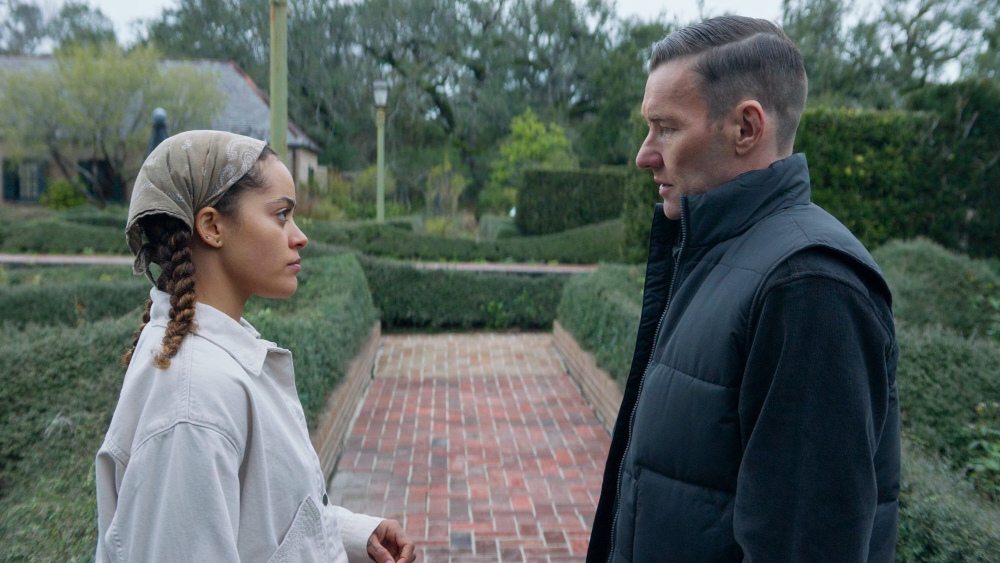
BTL: An icon, for sure.
Rodriguez Jr.: Yeah, a real icon. And some people can kind of classify him as this kind of old curmudgeon because he says whatever he wants to say, he’s very direct, and he makes up his mind very quickly. Whether he is right or wrong, he’ll make up his mind very quickly. But he’s also very collaborative. From the first film, he wanted new ideas, and so I wasn’t afraid to show him a scene how he scripted it, but then say, ‘Here Paul, what about this way?’ You know, he would go, ‘Oh, that’s amazing, that’s great, I love it. Let’s keep going with that.’
I recognize and I understand and I’m grateful for the opportunity to work with an icon in American cinema, and I don’t take that for granted at all. It’s just so rare that somebody at, you know, his level, his stature, would be so welcoming and open to new talent — young, eager filmmakers. I just don’t know anybody that would take the chances that he does. That’s just who he is. That’s what he’s always done — a lot of risk-taking and [taking] chances. It’s been going great.
BTL: Let’s dig into that collaboration… How would you describe Schrader’s vision for Master Gardener and what was your approach to crafting that vision as an editor?
Rodriguez Jr.: It’s a tricky question ’cause it’s not like we sit down and talk about what’s gonna happen in the movie. We just get at it. That being, like, our fourth movie at the time. I read this script and he wasn’t aware that this was like this indirect trilogy he was doing. Have you seen First Reformed and The Card Counter?
BTL: Yeah, of course!
Rodriguez Jr.: He wasn’t really aware [of] what he was setting up to do, you know, when he created these films, [and] how close they are to Taxi Driver and Light Sleeper. I read the script and I thought it was great. You know, the movie that came out is different. I can talk about the differences from the script that I read, and what it came out to be. I loved it, you know — he always works in metaphors, [and I loved] the metaphor of this gardener.
The flashbacks of who this character was, and he’s in the Witness Protection program, and then he falls in love with this young character, and it’s [an] interracial [romance]. It has a lot of layers involved. And then the white supremacy, that layer was added later, right before, I think, [as we got] close to production. The first draft of whatever he sent me didn’t have that element. I think Paul is a rebel and he will go the opposite of what people tell him. I think a lot of people… when he sends his scripts out [to] his friends, he gets feedback from people. A lot of people were a little hesitant [about] this really kind of provocative relationship between Narvel and Maya, and the kind of love triangle between Norma as well, and it being interracial.
So what he does is then takes it a step further and is like, ‘Okay, I’ll show you what can be more edgy’ or whatever. And then the white supremacy, Proud Boy element became another layer, and I thought it was really fascinating. He doesn’t do any kind of, at least to my knowledge, I don’t know how much shot listing he does. He doesn’t do storyboards. We talk about it, of course, all the topics and the elements of the movie. First Reformed being the kind of more controlled out of the three, [and] we’ve gotten less controlled. They’re still kind of in that vein of his style, based off, like, transcendental filmmaking. I think since he wrote that book, he’s just had such an interest in that style of filmmaking and that applies to these deeply personal kinds of character studies.
So, in crafting the film, this one was the most challenging out of the three of ’em. With First Reformed, he knew that movie. I guess it was a movie that he always kind of hesitated to write. With Card Counter, he knew that one really well. But this one was a little bit more challenging, and I think it was more because of how complex and layered it was, with all the different subject matter that’s going on. So in the editing process, when he’s shooting, he has to shoot very quickly because he has very few days. These are small budgets, of course, and so he does a lot of editing in-camera, which he’s always done. That’s primarily to make his day, and he’ll do takes, masters where it’s the whole scene.
Then, like, if you look at the lunch scene [at the diner] in Master Gardener with the three characters, he’ll do the master throughout, like one take, the whole dialogue, and then he’ll do another take of the master, but then he’ll have the actors do the beginning and then skip over the middle and then do the end, and then he’ll go into his coverage. He’s doing a lot of editing in his head. It doesn’t always work out well, because we get into the editing room and he’ll ask to see another take and then he’ll realize, ‘Fuck, I had them skip ahead because we had to make the day.’ But in this film, we shifted a bunch of things around structurally. After the first screening, I usually have pretty close to the rough assembly, cut when he is done shooting, minus, like, the last few days of footage. And then I’ll take a couple [of] days [and] put that stuff in there.
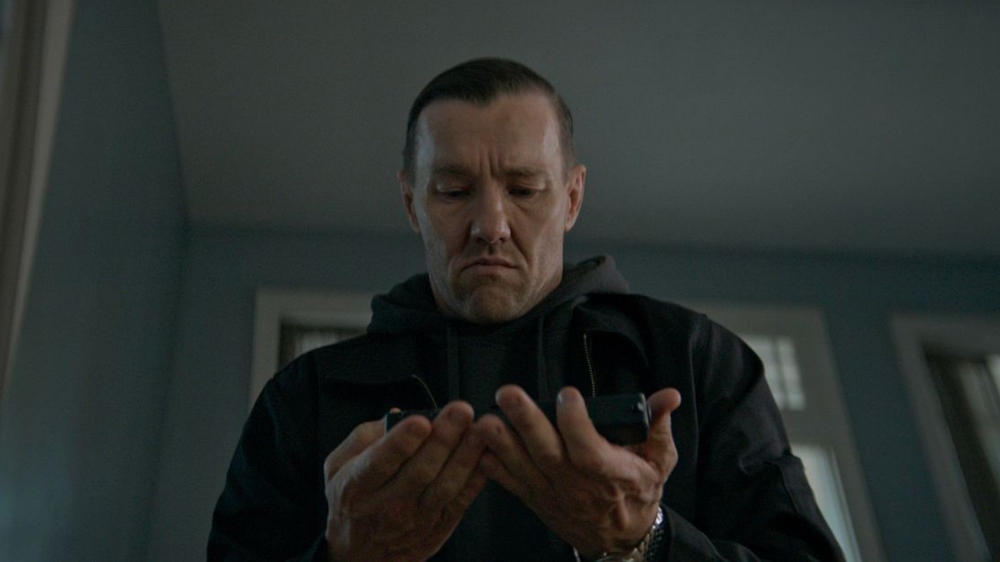
BTL: So you’re editing during production?
Rodriguez Jr.: Yeah, yeah. We’re always editing during the shoot. He’s not very vocal during it. He’s just kind of focused on shooting. If it’s something that is more elaborate, then he might have me start to put something together or ask me if we’re good on angles and shots. But I’m editing during shooting. I have most of the assembly [cut] put together by the time he is done. Then when he comes in, you know, we just start at the beginning and we start going through it. But this one was a little bit more challenging. We spent, like, two or three weeks on the first cut, and then we had screenings. We’ll screen it, and then at the beginning of the week, we’ll work on those notes, screen it [again] at the end of the week, and then we repeat that for weeks.
BTL: Devonté Hynes, who’s also known as Blood Orange, composed the score, so I’m curious what your editorial process was like as far as the music goes. Did you work closely with Hynes on this film?
Rodriguez Jr.: I didn’t get to work that closely with him because there are small budgets and so they can’t have everybody on. I finished picture lock, [but] Paul still kind of works on the score, [and] he’ll send me versions of stuff. I think my assistant’s plugging things in, laying it to picture. We always kind of start off doing stuff with a lot of temp music, which has its downfalls and its advantages because you can put music to everything. [The] downfall is because you kind of get married to what the temp music is. It’s a pitfall because you can start to create your score for the movie, but wanting it to have the same sound as the temp music. I always like a composer to come on, just get the feeling of what the score is, and the emotional beats, and then go off and create their own stuff to it.
Paul was with Devonté a lot, and working through it. Devonté doesn’t do too many scores. Paul, with these three films, he’s interested in a very kind of different score. You know, this movie had the most music out of the three of ’em. First Reformed, at first, because of these guidelines and these rules that he wanted to [follow], with no camera movements, there wasn’t going to be any score. Then that changed in the editing room. When they were shooting First Reformed, he added more camera moves to the picture. But with First Reformed, you know, Lustmord did the soundtrack, and that’s really just, like, soundscape. It’s not, essentially, really score because it’s so kind of low-end in a particular feeling that we’re trying to give. It’s not really introduced, I think, until, like, the third act.
Robert Been did The Card Counter score. That got more musical, with actual songs written for particular scenes. Then this one, we only had one song, which is the end song, that was based off of S.G. Goodman. He loves that S.G. Goodman track. It was in the script that the movie was ending with that track. They rerecorded it because S.G. has a very kind of southern voice, and he felt it needed to have more of an R&B vibe to it. So I think that’s when Devonté brought in Mereba to do that track. But, it’s really just temp music, and then Devonté starts to get rough cuts as we’re getting closer to picture lock, and then he starts scoring stuff to those. Then he’ll send it to me, cause we’re still cutting. I lay’em in, we talk about, I could move things around, and try different pieces of score in different places.
I wish I had more of an opportunity to work with Devonté. I think that would’ve been great. But unfortunately, ’cause of all these budgetary reasons, you miss some of those opportunities.
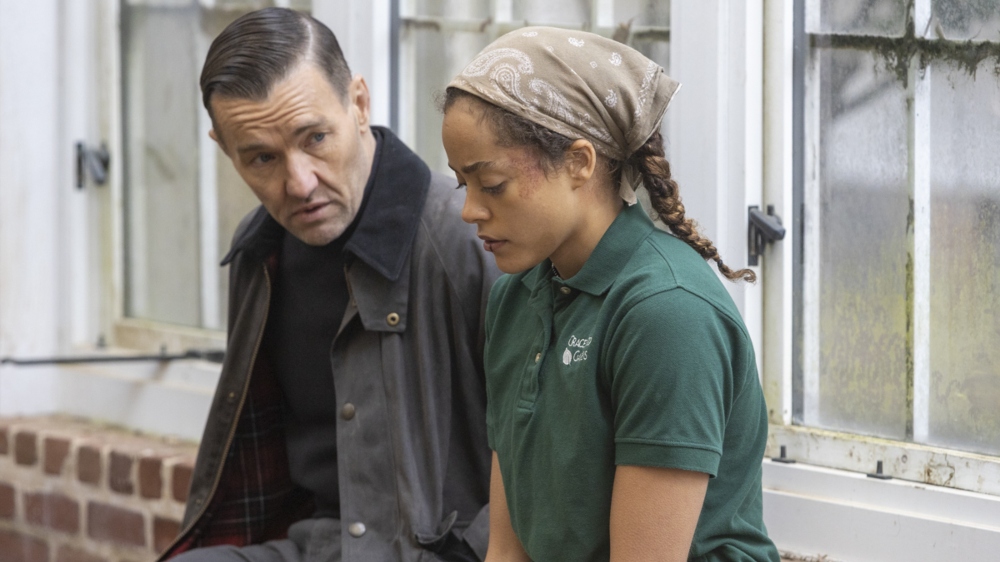
BTL: What software did you use to edit, and were there any tools that you found particularly helpful during the post process?
Rodriguez Jr.: On this one, I used Adobe Premiere, the newest version of it. I’m an editor [who’s] not kind of married to one platform. When I still do commercials, I’ll alternate between Avid and Premiere. I learned on Final Cut back in, like, 2002, 2003, and then was able to kind of seamlessly move to Premiere ’cause it’s pretty much the same thing. But this one was different because I wanted to try to test out a more cloud-based edit.
I was going to start the movie editing at home because they were shooting in New Orleans. So they would upload all the footage to a cloud service called Lucid Link. I heard about all this stuff from the commercial world. I had done some commercials right before Master Gardener, and I was like, ‘Oh wow, look, this is pretty cool.’ I wanted to get more acclimated with that platform, with that kind of way of working. I knew Lucid Link, and then I heard that Adobe Premiere works better with Lucid Link. So I was like, ‘Okay, I’m going to work at home for a bit.’ My assistant was in the process of moving to California, so she needed to be remote as well. Then once production stopped, we were gonna be editing up in Pleasantville, New York at the Jacob Burns Media Arts Center.
Paul, at the time, lived up in Putnam Valley. He’s getting of age, and can’t do the commute into New York, you know, driving all the time, [especially] driving back late. So he asked if I would be able to do that. It was, like, an hour away from my house. So I made that commute every day. I wanted something that was a lot more mobile. I didn’t want to have to have a shuttle drive with me at home and then take that to the onsite editing room. I talked to production and introduced them to Lucid Link. They were sold on it. It’s relatively cheap [and] pretty affordable. So everything was uploaded to that. And then my assistant could see that in California. I could see that here.
What I did was, I contacted some representatives from Adobe. I told them how I’m planning to work and they said, ‘Are you using Adobe Productions?’ I had never used Adobe Productions before. I didn’t even know about it. They’re like, ‘Okay, you should use this ’cause this is gonna make everything easier.’ Just like an Avid, it’s one project that’s shared by everybody — Assistant Editors, Editors.
An assistant can open up the bin, [the] editor can see that it’s locked, and then the assistant can close it, and then the editor can refresh. Adobe makes all kinds of bins… to keep the file size of the whole project down so that it doesn’t take five or 10 minutes to open up the film. Then my assistant can be in California working in [the] Scene 23 bin, and I can still have the bin open, and I can pull things from it, which is amazing. Then she can finish loading stuff to it, close it, I can hit refresh and then it’s there.
It feels just like Avid, in terms of accessibility, of not having her send me a separate project, me having to bring it in, etc. We’re all in the same production. There’s a quickness and ease of just getting access to things really quickly. It’s customizable. So with Adobe and with Lucid Link, the integration was pretty much seamless.
When we were doing Card Counter, we cut that whole movie virtually. The pandemic jump-started this whole kind of remote cloud-based editing. On Card Counter, we used Evercast to do our sessions. I wasn’t gonna be the one [who] gave Paul Covid. God forbid something happened to Paul Schrader because of his editor! I said, ‘I’m staying away from you as much as possible. I’m not going near you.’ It worked out great. It was weird to cut the whole movie virtually and not being in a room, not being able to screen it for people, but because of the circumstances now, it’s just kind of exploded with cloud-based editing. Shooting straight from the camera to the cloud.
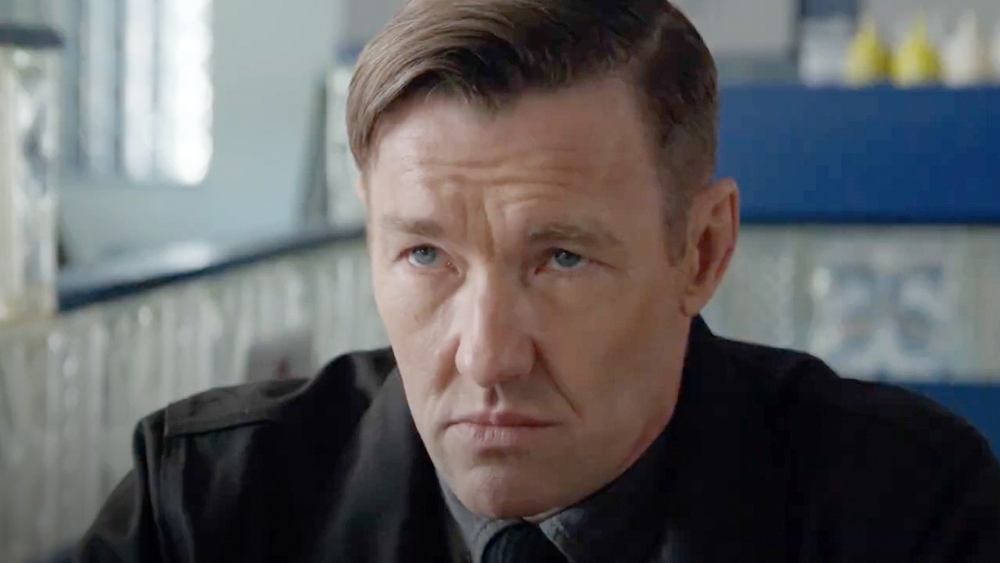
BTL: Looking back at your experience, what would you say was your biggest insight working on this film?
Rodriguez Jr.: With Master Gardner, it was the most challenging of the three of ’em. We structurally changed a bit from how it was written, based [on] the first screening. It was the first time that I saw Paul nervous, and he doesn’t get nervous. He didn’t necessarily think the movie was working, at the beginning. After the first screening, we had dinner and we were talking about the movie, and talking about how to tear it apart and restructure things. So my biggest insight was that it’s always a puzzle. It’s not concrete. All these things are very fluid. Simple things.
You could take a scene like the tattoo scene — the tattoo reveal. That originally came, I think, about an hour into the movie. You’d learned about Maya and Narvel’s relationship and the dynamic with Norma. You saw Norma as she asked Narvel to take her to bed, and she’s looking at the shirt, and at the time, the viewer doesn’t know what she’s looking at when he takes the shirt off. Then you learn later, way later, about his past, and right off the first screenings, we knew we had to bring that up way sooner. We brought it up in the first reel, first 20 minutes. Just that shift right there, just taking that, that scene of him in bed, it’s night, and then he gets up, and then he has the voiceover, taking that, and putting it up front, shifted the whole dynamic of the movie. Now, the viewer knows his past [and] you learn that Norma knows his past because now you know what she’s looking at in the tattoos.
Now it’s this question [and] this tension and suspense, almost, of every interaction he’s gonna have with Maya, [because] the audience is gonna have this understanding of who he is. Now you’re kind of waiting for a reveal. You’re waiting for an explosion to happen once or if she finds out. That’s what I love about editing, you know — it’s writing. It’s what’s going on now with the WGA and what they’re fighting for. Editing is, of course, writing, and it’s the last time that you’re gonna get to do whatever and change the movie however it needs to be changed. It’s the last draft of the film.
Figuring out that puzzle is always a challenge. It’s always so rewarding to me to figure things out and, and shift things here and there. The flowers blooming on the road [scene], that came at a different place as well. It didn’t happen right after the sex scene. It happened during one of their road trips, and as soon as we moved it after the sex scene, it was, you know, it was just like “boom.”
BTL: Oh, yeah. It needed to be there.
Rodriguez Jr.: Now that scene means so much more and it’s different. And the juxtaposition when you see scenes how they’re scripted and — the flower blooming during their road travels means one thing, but then putting it after the powerful, very provocative sex scene, [it] has a whole other connotation. I think that was my biggest insight into this and, you know, the pleasure of working with Paul, who is brilliant and just wants to make the best film. He’s just highly intelligent and he doesn’t get married to his dialogue, he changes VO around. We were able to kind of do things on this one — ADR, pickup shots, and stuff like that — to kind of turn the ship around from the first screening [and steer it toward] what it became. And that’s really enjoyable.
Master Gardener is still playing in select theaters, and it will be available to buy or rent on all major VOD/digital platforms on June 6.





